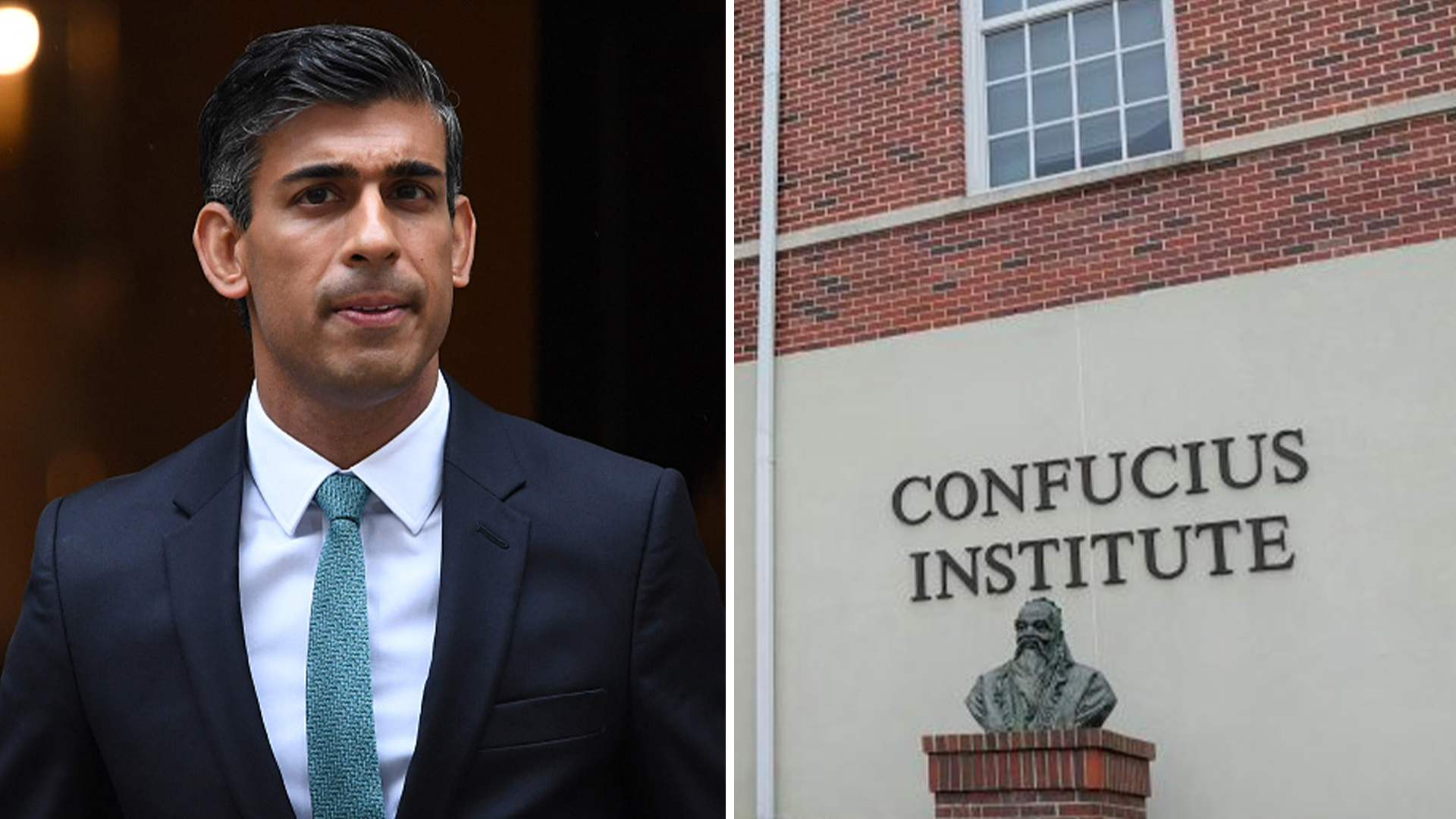
The UK government is set to ban Confucius institutes from British universities to fulfill Prime Minister Rishi Sunak's leadership campaign pledge. /CGTN
The UK government is set to ban Confucius institutes from British universities to fulfill Prime Minister Rishi Sunak's leadership campaign pledge. /CGTN
Editor's note: Abhishek G Bhaya is a senior journalist and international affairs commentator. The article reflects the author's opinions and not necessarily the views of CGTN.
British Prime Minister Rishi Sunak is reportedly looking to disband Confucius institutes in the UK, in a clear sign that the new government in London will continue to pursue an anti-China foreign policy. There are 30 Confucius institutes in the UK with a defined goal of teaching Mandarin language and Chinese culture classes to international students.
The UK's Minister of State for Security Tom Tugendhat confirmed in the parliament on Tuesday that the government is set to ban Confucius institutes from British universities to fulfill Sunak's leadership campaign pledge. A known China hawk, Tugendhat alleged, without any credible evidence, that the institutes "pose a threat to civil liberties in many universities in the United Kingdom."
Earlier this summer, during the Conservative leadership contest to replace former prime minister Boris Johnson, Sunak described China as the "largest threat to Britain and the world's security" – a claim that was fervently refuted by Beijing – as he took a more hawkish stance on foreign affairs pledging to close the Confucius institutes once he becomes the prime minister.
Prior to the leadership race, Sunak was seen as a politician and lawmaker with a pragmatic view on China, a perception that was exploited by his opponents within the party, including Liz Truss, to accuse him of being soft on Beijing. Due to the dominant anti-China narrative in the UK's domestic politics, Sunak appears to have taken the bait and hardened his position on China.
The decision to ban Confucius institutes, which is likely to be rolled out in the coming weeks, will add to the fake "China threat" narrative being pushed by Western capitals and the continuing trend of the UK engaging in unprovoked and malicious hostility against China. At the same time, it would be a symbolic and visible gesture cementing Sunak's credentials as a leader who is tough on China.
While this may endear Sunak – still in his early days at 10 Downing Street – among the anti-China hawks in the country, the decision will have far-reaching ramifications for Britain's ties with China at a time when the UK is facing multiple political and economic challenges at home and is in dire need to have a forward-looking constructive foreign policy.
When Sunak was elevated to the role of Britain's new prime minister last week, China sent out a clear message that it wants a relationship of "mutual respect and mutual benefit" with the UK under its new leadership.
"China's position on developing its relations with the UK is consistent and clear. Cultivating and advancing sound bilateral ties is the shared responsibility of China and the UK," Chinese Foreign Ministry Spokesperson Wang Wenbin said. "It serves the common interests of both our peoples. China hopes to advance ties with the UK along the right track on the basis of mutual respect and mutual benefit."
However, the British Prime Minister, in his first official talks with U.S. President Joe Biden discussed ways to put up a joint front to deal with the so-called "challenges" posed by China, revealing where London's loyalties lie. Beijing for the umpteenth time reiterated that China is not a "threat or challenge" but "a development partner and an opportunity for other countries."
The Chinese Foreign Ministry urged the U.S. and the UK to abandon the zero-sum mentality. "Instead of propagating the obsolete 'China threat' theory and piecing together small blocs that are bound to fail, the U.S. [and the UK] might as well try to adopt a new vision featuring openness, inclusiveness and win-win cooperation and do more to contribute to a more peaceful and prosperous world," Wang advised.
A bridge between China and other nations

Young participants at the booth of the Confucius Institute Headquarters at the London Book Fair, in London, the UK, April 17, 2012. China was the guest of honor at the 2012 London Book Fair. Ten years on, the UK is reportedly looking to close the Confucius institutes in the country. /CFP
Young participants at the booth of the Confucius Institute Headquarters at the London Book Fair, in London, the UK, April 17, 2012. China was the guest of honor at the 2012 London Book Fair. Ten years on, the UK is reportedly looking to close the Confucius institutes in the country. /CFP
Related story: Confucius Institutes a bedrock of China’s growing cultural ties with Africa
From China's perspective, Confucius institutes are an extension of that same new vision. The first Confucius Institute opened in the Republic of Korea in 2004, and today there are around 550 across the globe. The institutes have long served as a bridge and bond between China and other nations.
Chinese President Xi Jinping has rightly described the Confucius institutes as "a symbol of China's unremitting efforts for world peace and international cooperation."
In its framework and mandate, China's Confucius institutes are similar to the UK's British Council, the U.S.'s American Center, Germany's Goethe-Institut or France's Alliance Francaise. Like its British, American and European counterparts, Confucius institutes offer language lessons and cultural exchange programs.
However, certain countries in the West have been running a well-orchestrated campaign of slander, hysteria and paranoia targeted at Confucius institutes for some time, in line with their "China threat" propaganda. This is a self-defeating exercise.
The notion that an institution promoting the language and culture of a particular country can, in some way, be a political and ideological threat to another country goes against the basic fundamentals of international exchange and cultural cooperation. If the wild Western allegations against Confucius institutes are given credence, what would stop other countries from making similar claims against the American Center, British Council, Goethe-Institut and Alliance Francaise for instance?
As such, in the long run, Sunak's desire to close down Confucius institutes while pandering to the anti-China hawks at home and beyond is ill-advised.
(If you want to contribute and have specific expertise, please contact us at opinions@cgtn.com. Follow @thouse_opinions on Twitter to discover the latest commentaries on CGTN Opinion section.)